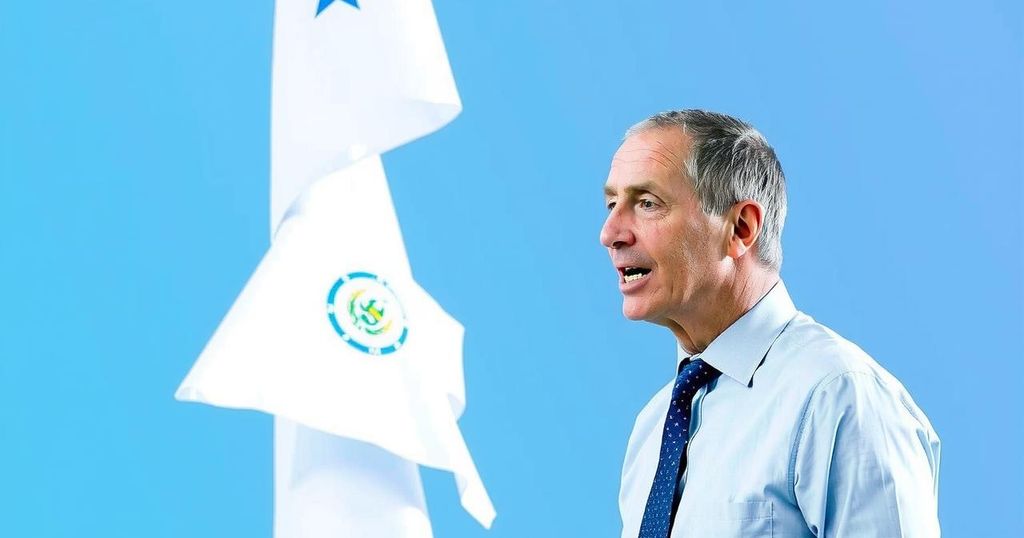Uruguay’s Presidential Runoff: Delgado and Orsi in a Tight Contest

Uruguay’s presidential election runoff between Álvaro Delgado and Yamandú Orsi sees both candidates in a close competition following a prior inconclusive vote. With key issues like crime and economic policies at the forefront, voter indecision and potential low turnout pose challenges. Both candidates seek to cooperate post-election, emphasizing national unity and the importance of democratic processes in Uruguay.
On Sunday, Uruguayans participated in the decisive second round of the presidential election, witnessing a contest between the ruling conservative governing coalition and the opposition left-leaning Broad Front. With both parties unable to secure a majority in the first round, the runoff has sparked intense scrutiny, especially as numerous polls suggest an exceptionally close race. Álvaro Delgado of the governing coalition, who secured 27% in the initial voting, faces off against Yamandú Orsi from the Broad Front, who garnered 44%. The political landscape remains precarious, with undecided voters impacting the outcome significantly, as electoral officials prepare for potentially prolonged results reporting reminiscent of the contentious 2019 runoff that brought Luis Lacalle Pou to power, ending a 15-year leftist tenure.
Vote turnout is anticipated to be low, despite mandatory voting laws, due in part to the inability of either candidate to galvanize enthusiasm among the electorate. Analyst Nicolás Saldías has noted that the current campaign lacks the urgency of prior elections as both candidates maintain similar stances on critical issues, such as social spending and the economy. The rising concern regarding violent crime adds another layer to their campaigns, with Delgado advocating for stringent law enforcement while Orsi focuses on community-led initiatives.
From a historical context, the governing party’s recent tenure under Lacalle Pou has been marked by significant economic growth and increased social stability, despite facing corruption allegations. The current president, who is constitutionally barred from a consecutive term, leaves behind a coalition enjoying favorable approval ratings. Delgado, aiming to continue the outgoing administration’s policies, has positioned himself as a continuity candidate. In contrast, Orsi’s campaign reflects a vision rooted in social progress, gaining momentum from the legacy of former president José “Pepe” Mujica, who remains an influential figure within Uruguayan politics.
Despite their differing approaches, both candidates have expressed intentions to foster bipartisan cooperation post-election. Delgado has indicated a desire to work with Orsi, suggesting a possible dialogue centered around national unity and consensus. The political ambiance in Uruguay, marked by stable institutional frameworks and a commitment to democratic processes, underscores the significance of this election, which may set the course for the nation’s future amidst evolving socio-economic challenges.
The context of this article revolves around the second round of the Uruguayan presidential elections, a significant democratic process in a nation known for its relative stability in governance. This election follows a prior round in which neither major political coalition achieved an outright victory, necessitating a runoff. The two primary candidates represent distinct political ideologies, with the conservative National Party aiming to maintain its governance against the backdrop of the left-leaning Broad Front, which previously held the presidency for 15 years. The political landscape is further complicated by societal issues such as crime and economic policies, which have influenced voter sentiment leading up to the election.
In conclusion, the Uruguay presidential runoff election has emerged as a crucial political event characterized by a tight race and significant indecision among voters. With the incumbent ruling coalition attempting to secure its position against a formidable left-wing challenger, the outcome remains uncertain. The broader implications of this election extend beyond party politics, reflecting the evolving needs and concerns of the Uruguayan populace in an increasingly complex socio-economic environment.
Original Source: gazette.com







